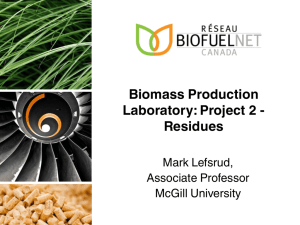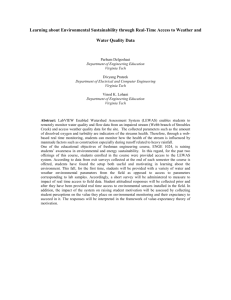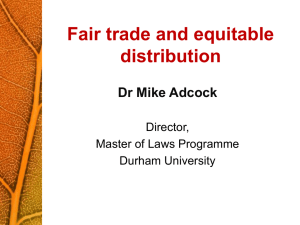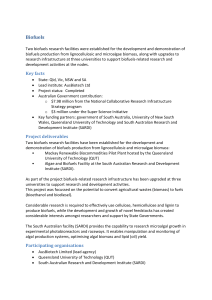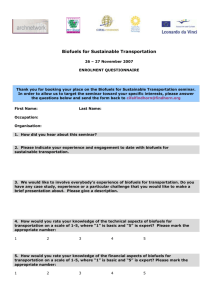Biofuels Mini-Symposium: The Biofuel Revolution: Potential
advertisement
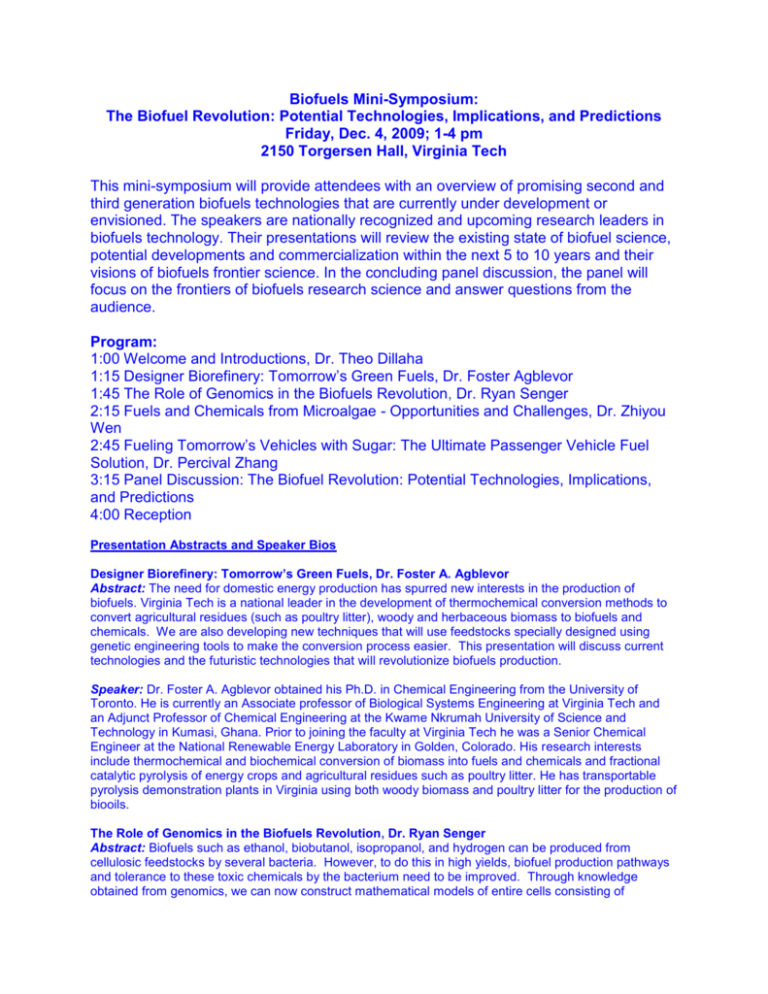
Biofuels Mini-Symposium: The Biofuel Revolution: Potential Technologies, Implications, and Predictions Friday, Dec. 4, 2009; 1-4 pm 2150 Torgersen Hall, Virginia Tech This mini-symposium will provide attendees with an overview of promising second and third generation biofuels technologies that are currently under development or envisioned. The speakers are nationally recognized and upcoming research leaders in biofuels technology. Their presentations will review the existing state of biofuel science, potential developments and commercialization within the next 5 to 10 years and their visions of biofuels frontier science. In the concluding panel discussion, the panel will focus on the frontiers of biofuels research science and answer questions from the audience. Program: 1:00 Welcome and Introductions, Dr. Theo Dillaha 1:15 Designer Biorefinery: Tomorrow’s Green Fuels, Dr. Foster Agblevor 1:45 The Role of Genomics in the Biofuels Revolution, Dr. Ryan Senger 2:15 Fuels and Chemicals from Microalgae - Opportunities and Challenges, Dr. Zhiyou Wen 2:45 Fueling Tomorrow’s Vehicles with Sugar: The Ultimate Passenger Vehicle Fuel Solution, Dr. Percival Zhang 3:15 Panel Discussion: The Biofuel Revolution: Potential Technologies, Implications, and Predictions 4:00 Reception Presentation Abstracts and Speaker Bios Designer Biorefinery: Tomorrow’s Green Fuels, Dr. Foster A. Agblevor Abstract: The need for domestic energy production has spurred new interests in the production of biofuels. Virginia Tech is a national leader in the development of thermochemical conversion methods to convert agricultural residues (such as poultry litter), woody and herbaceous biomass to biofuels and chemicals. We are also developing new techniques that will use feedstocks specially designed using genetic engineering tools to make the conversion process easier. This presentation will discuss current technologies and the futuristic technologies that will revolutionize biofuels production. Speaker: Dr. Foster A. Agblevor obtained his Ph.D. in Chemical Engineering from the University of Toronto. He is currently an Associate professor of Biological Systems Engineering at Virginia Tech and an Adjunct Professor of Chemical Engineering at the Kwame Nkrumah University of Science and Technology in Kumasi, Ghana. Prior to joining the faculty at Virginia Tech he was a Senior Chemical Engineer at the National Renewable Energy Laboratory in Golden, Colorado. His research interests include thermochemical and biochemical conversion of biomass into fuels and chemicals and fractional catalytic pyrolysis of energy crops and agricultural residues such as poultry litter. He has transportable pyrolysis demonstration plants in Virginia using both woody biomass and poultry litter for the production of biooils. The Role of Genomics in the Biofuels Revolution, Dr. Ryan Senger Abstract: Biofuels such as ethanol, biobutanol, isopropanol, and hydrogen can be produced from cellulosic feedstocks by several bacteria. However, to do this in high yields, biofuel production pathways and tolerance to these toxic chemicals by the bacterium need to be improved. Through knowledge obtained from genomics, we can now construct mathematical models of entire cells consisting of thousands of chemical reactions in order to test new hypotheses on the computer before testing in the laboratory. Genomics has also led to combinatorial approaches in which genetic variants compete against one another in a combinatorial "survival of the fittest" assay that leads to new and improved strains. This presentation will describe how genomics can contribute to the biofuels revolution. Speaker: Dr. Ryan Senger joined Virginia Tech as an Assistant Professor of Biological Systems Engineering in January 2009. Before joining Virginia Tech, he was an NIH National Research Service Award postdoctoral fellow at the University of Delaware and Northwestern University in their chemical engineering departments. Dr. Senger received his PhD in chemical engineering from Colorado State University in 2005 and holds a bachelor's degree in Chemistry from Millikin University. Dr. Senger's research interests are in systems biology and metabolic engineering related to renewable fuels and chemicals production. Specifically, he has generated a genome-scale mathematical model of the biobutanol producer Clostridium acetobutylicum (consisting of over 500 chemical reactions) and has engaged in using this model to develop superior industrially relevant strains. Since joining Virginia Tech, Dr. Senger has started the Systems Biology and Metabolic Engineering Laboratory in Biological Systems Engineering, and his research group is developing new technologies for amino acids production and unlocking the keys to the digestion of cellulose by biofuel-producing clostridia. Fuels and Chemicals from Microalgae - Opportunities and Challenges, Dr. Zhiyou Wen Abstract: Microalgae constitute a large resource of genetic and metabolic diversity, which has been largely untapped for products of commercial interest. In recent years, microalgae have gained broad interest as an alternative biofuels feedstock. This presentation will provide an overview of the algal biofuels production chain and the current and projected status of this emerging technology. Speaker: Dr. Zhiyou Wen’s background is chemical/biochemical engineering with particular focus on fermentation processes development. He obtained his PhD from the University of Hong Kong and worked as a postdoctoral associate at Washington State University before joining Virginia Tech as an Assistant Professor of Biological Systems Engineering and extension specialist in 2005. His current research program focuses on the development of biomass refineries and bioenergy production with three research areas: (1) producing liquid biofuels from autotrophic microalgae culture, (2) developing highvalue products through heterotrophic algal fermentation, and (3) developing anaerobic animal waste treatment for biogas production, nutrient removal, and pathogen reduction. Fueling Tomorrow’s Vehicles with Sugar: the Ultimate Passenger Vehicle Fuel Solution, Dr. Percival Zhang Abstract: This presentation describes an efficient technology for producing hydrogen from biomass sugar and how this technology can be adapted for vehicular transportation. The technology uses biomass sugars as a hydrogen carrier and results in complete conversion of sugars and high purity hydrogen production. Successful development and implementation of this technology would result practical sugarpowered vehicles with high power density, high energy density, affordable fuel costs, and nearly zero greenhouse gas emissions. Speaker: Dr. Yi-Heng (Percival) Zhang is an Assistant Professor of Biological Systems Engineering at Virginia Tech and an affiliated investigator of the DOE BioEnergy Science Center. Prior Virginia Tech, he was a biofuels research scientist, postdoc associate, Ph.D. student at Dartmouth College. He received his BS and MS in biochemical engineering from East China University of Science and Technology, Shanghai. His research interests include cost-effective production of second generation of liquid biofuels (e.g., ethanol), third generation biofuels (e.g., hydrogen and electricity), biomass conversion, biorefinery design, cellulase engineering, cellulose hydrolysis modeling, consolidated bioprocessing microorganism development, synthetic biology, enzymatic biofuel cells, and life cycle analysis. For more information, contact: Theo A. Dillaha, professor of biological systems engineering, 540-231-6813 or dillaha@vt.edu
